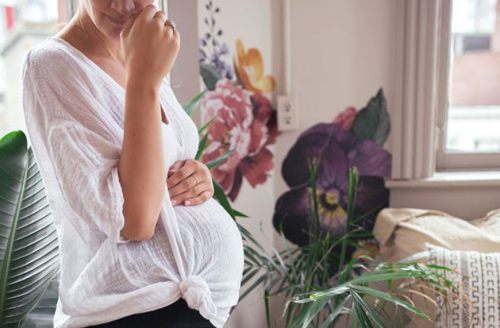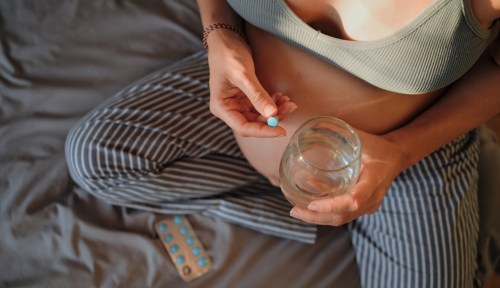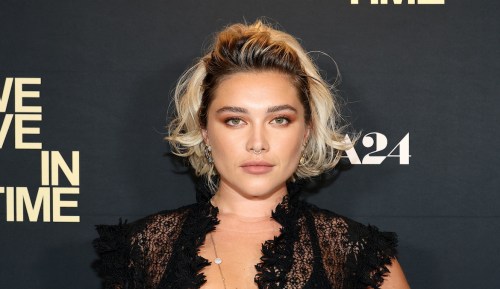Our editors independently select these products. Making a purchase through our links may earn Well+Good a commission
Cannabis use is on the rise with pregnant women—here’s how doctors feel about it
A new study shows tthe number of women who use marijuana during pregnancy is on the rise. But is it safe? Here, doctors explain everything you need to know.

Like dad sneakers on a Fashion Week runway, cannabis is suddenly popping up in the most unexpected places. Entrepreneurs are openly sharing how they microdose it at work, Whole30 devotees are including it in their meal plans, and it’s even become a staple in our period care routines. Certainly this was happening before 2012 (when Colorado and Washington became the first states to legalize recreational marijuana) but thanks to a recent wave of legalization and a shifting of societal norms, more people are embracing weed in their daily lives.
And that includes during pregnancy. According to a recent report from the U.S Department of Health and Human Services, the number of pregnant women who used cannabis in a 30-day period rose from 3.4 percent in 2015 to 7.1 percent in 2017. (The report uses data from the National Survey on Drug Use and Health, which interviews about 67,000 people annually.) It should be said that the overall number of mothers using cannabis, while rising, is still smaller than the number of those who use cigarettes or alcohol—14.7 percent and 11.5 percent of pregnant women in 2017, respectively.
But given the fact that you’re not even supposed to do innocuous things like use retinol or eat sushi while pregnant…is using marijuana during pregnancy okay?
Why pregnant women turn to weed
Most doctors are not on board with this trend. “The current recommendations from government and medical societies are that there is no known safe amount of cannabis use during pregnancy,” says Kerri Masutto, MD, a functional medicine doctor at Parsley Health in San Francisco. “Current guidelines recommend treating marijuana use during pregnancy the same as alcohol and cigarettes—that women thinking about pregnancy, who are pregnant, or who are breastfeeding should avoid all use.”
“As a medical professional, I in no way would recommend any cannabis use during pregnancy,” says Paul Y. Song, MD, who is the chief medical officer of cannabis-centric funding partnership Calyx Peak Capital. Same goes for CBD, in his opinion. He references multiple studies that link a pregnant mother’s cannabis consumption with low birth-weight babies, as well as literature that states cannabinoids may interfere with the baby’s development in utero. Dr. Masutto adds that marijuana—its psychoactive compound THC, in particular—can cross the placenta, which means that it’s able to enter the developing fetus’ body.
“Women thinking about pregnancy, who are pregnant, or who are breastfeeding should avoid all use of marijuana.” —Kerri Masutto, MD
Despite this, some women are turning to cannabis during their pregnancies for medicinal purposes. (Others, of course, might just be using it recreationally.) Family physician and birthing counselor Stacey Kerr, MD, says that nausea, stress, and insomnia are a few reasons why a pregnant woman might reach for an edible or a vape pen—especially if she’s wary of pharmaceutical solutions, which often come with their own side effects. And many prescription solutions for those issues are limited during pregnancy. For example, Ambien (commonly used to treat insomnia), can cross the placenta into the fetus’ body and is a Class C medication, meaning that animal studies have shown it presents some risks to fetal development. To some women, weed might seem like a more natural solution. But again, most doctors do not recommend cannabis as a remedy for any of these issues during pregnancy and do not recommend using it at all while pregnant.
The limitations with existing recommendations
There’s still a lot unknown about the impact of cannabis on the body (good and bad), especially when it comes to fetal development. That’s largely because it’s under-researched, thanks to its status as a Schedule I drug by the federal government. It also remains illegal at the federal level, despite most states legalizing medical marijuana and some of them legalizing recreational marijuana, too.
What’s more, the research that has been done on using marijuana during pregnancy is problematic for a few reasons. “Studies looking at cannabis use during pregnancy often have many confounding factors, such as other substance use and socioeconomic contributors,” says Dr. Masutto. Basically, these extra factors can confuse the results of a study, making the results less cut and dry. For example, she says, “If a women is using both marijuana and alcohol, the effects can be significantly greater when combined, making any polysubstance use much more dangerous.”
“Just the fact that THC crosses into the brain of a developing fetus means we should think about this and be cautious.” —Stacey Kerr, MD
Plus, many studies from the U.S. involve self-reported marijuana use, which isn’t always reliable and can lead to skewed results. “Imagine you show up at a clinic because you’re pregnant, and the person doing the intake says, ‘Do you use cannabis?’ How many people are going to say to a person of authority, ‘Yes, I smoke pot’?” says Dr. Kerr. “Finding a good sample of people who actually use it in our culture and in this situation is hard.” Given some extreme cases where parents are arrested or even lose custody of their children because they test positive for THC during pregnancy, it makes sense that it would be hard to find people willing to admit to using it.
And Dr. Masutto points out that overall, the study results are inconsistent, with some reporting no adverse effects. “Searching PubMed, and reading the American College of Obstetrics and Gynecology’s recommendation, you can find a number of studies trying to report neuro-developmental delay, increased risk of childhood cancers, and even stillbirth reported,” she says. “But, ultimately, the data is often contradictory and minimally statistically significant.”
Even with all of these limitations, the majority of doctors recommend avoiding all marijuana use during pregnancy to be safe. “Just the fact that THC crosses into the brain of a developing fetus means we should think about this and be cautious,” Dr. Kerr says. Adds Dr. Masutto: “The long and the short of if is that we just don’t know exactly what the effects are and still need more data. It’s ultimately up to each individual woman to decide with her doctor.” That goes for all things cannabis-related, TBH.
Thanks to the rise of CBD, you can now harness the power of cannabis without getting high—from your coffee run to your spa appointments.
Sign Up for Our Daily Newsletter
Get all the latest in wellness, trends, food, fitness, beauty, and more delivered right to your inbox.
Got it, you've been added to our email list.










